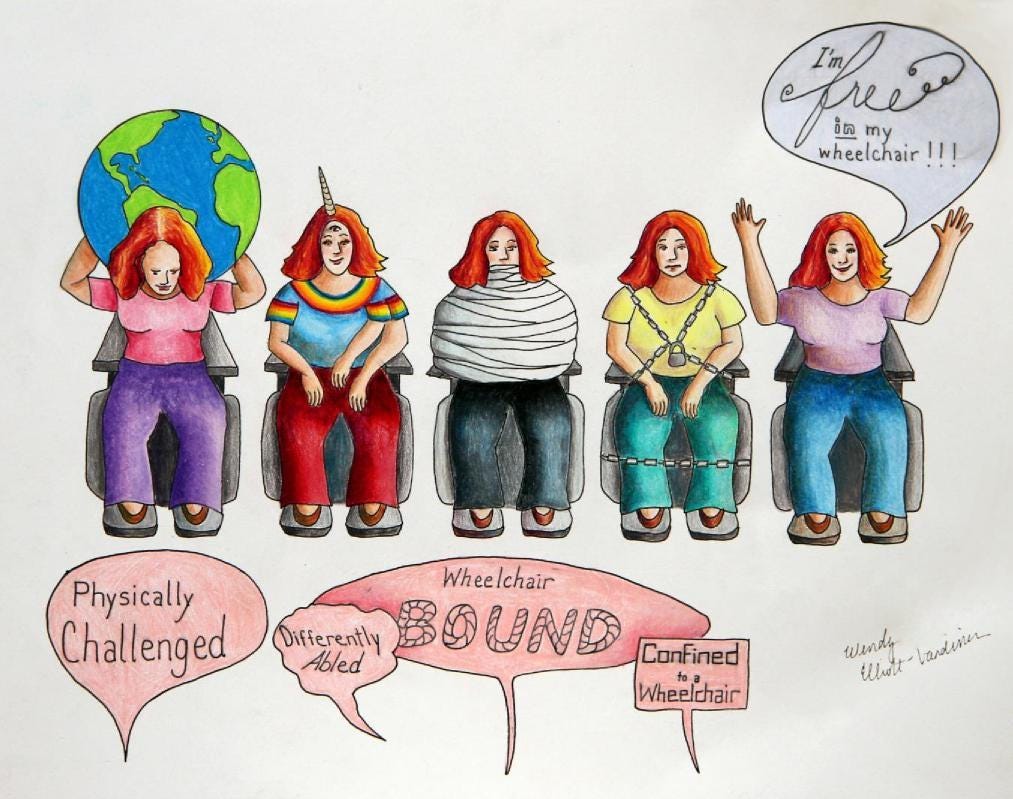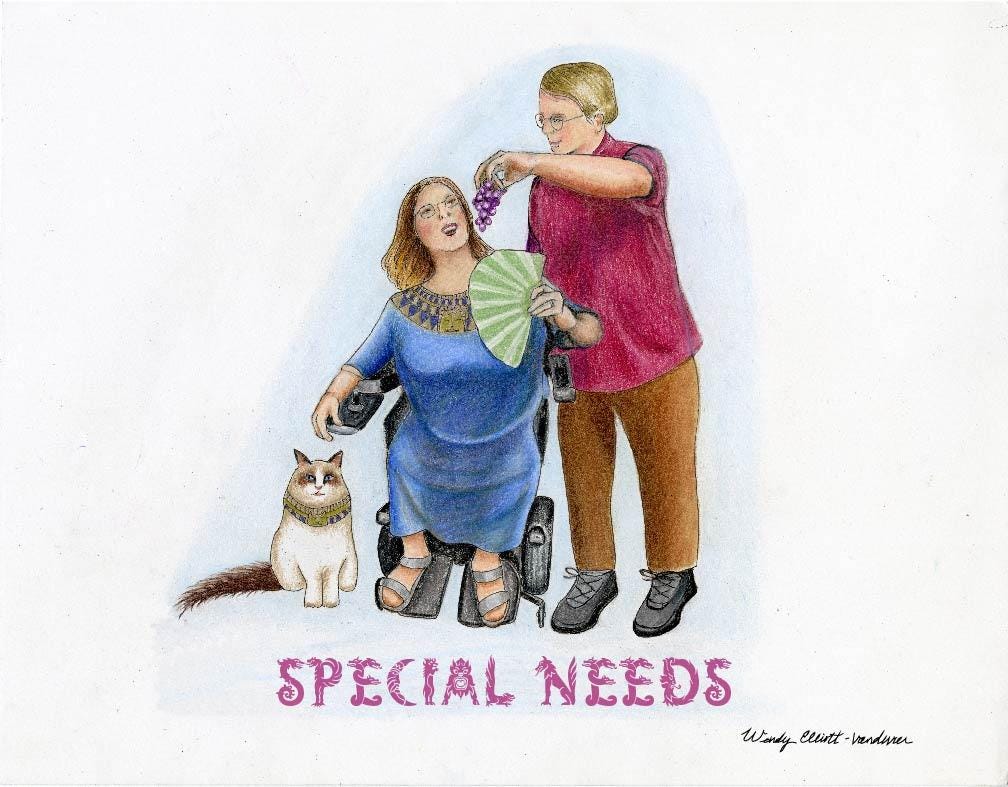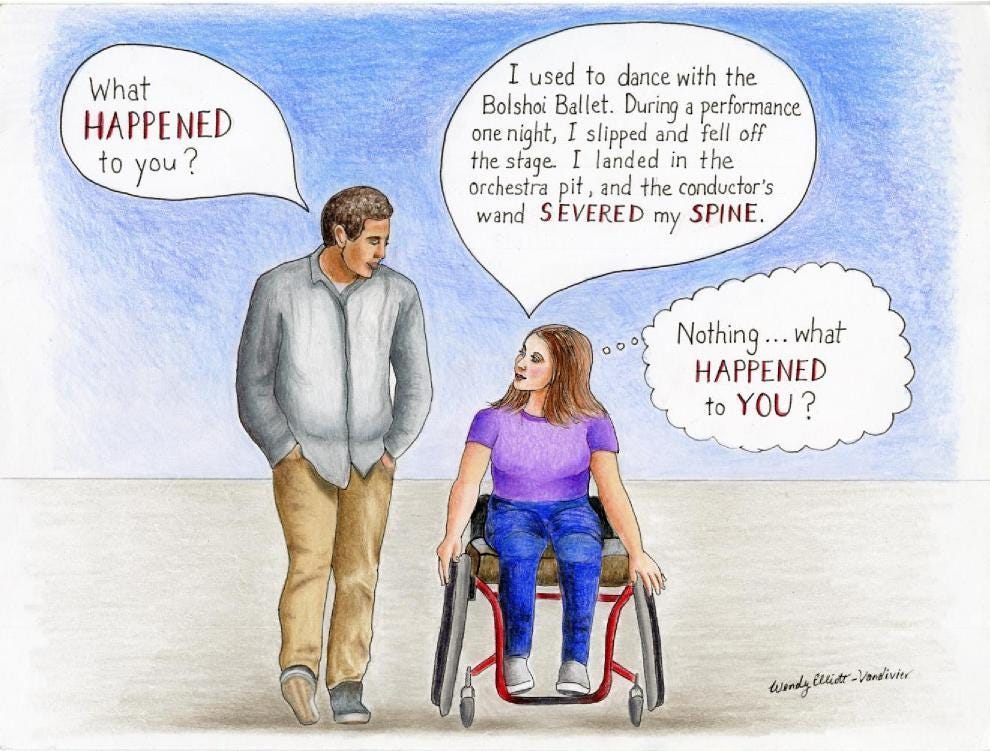I am an artist and life-long disability rights activist. In my own personal life, I have never separated my art and Judaism from my advocacy. It’s all about Tikkun Olam repairing the world – making it a better, accessible and just world for all of us. My paintings explore issues of family, memory and experiences as a disabled woman. My autobiographical cartoons focus on attitudinal barriers and stereotypes regarding disabilities, and some of the micro-aggressions that disabled people experience while living normal, “un-inspirational lives.” All of my work is based on true stories and real-life experiences. I paint and draw my reality, and I use humor to help educate others and cultivate disability pride.
I believe that an important consideration is terminology – or the types of words we use to describe people with disabilities. I created the cartoon, “Terminology,” to directly address this issue. This piece focuses on some of the euphemistic terms that society uses to describe people with disabilities. Older negative terms like ‘wheelchair bound’ and ‘confined to a wheelchair’ have in recent years been replaced by well-intentioned terms like ‘differently abled’ and ‘physically challenged’, yet all these terms deny the identity and pride of people with disabilities. Wheelchairs and other mobility devices are sources of freedom, and I hope that sugarcoated terms that look away from true identity can be replaced with disability pride. The best terminology for me is “Disabled person” with a capital “D” because my disability is part of my identity. Others may prefer the term “People with Disabilities.” We must, however, remember that terminology is constantly evolving, and we need to respect what terminology people in the community prefer.
In my cartoon, “Special Needs,” I am poking fun at another word that I personally do not like: Special Needs. This is a sugar coated, euphemistic term that denies and erases disability identity. My needs are not special – I have the same needs that everyone else has: the need for housing, food, education, employment, health care and so forth. My needs are the same as all humans, and it’s okay to just say the word, “disability.”
My cartoon, “What Happened to You?” focuses on the issue where strangers without disabilities often feel entitled to ask disabled people very personal questions. This happened to me all too frequently, and sometimes to protect myself I would make up outlandish stories. Many times, they bought it! This cartoon highlights a contradiction of life with a disability: you are often invisible in conversations, yet under the microscope when someone feels entitled to examine your life. Hopefully, my art can educate people without disabilities to respect privacy and boundaries when interacting with people with disabilities.
I have also engaged diverse audiences of children, teens, and adults through hands-on art-based workshops that examine both ableism and disability pride. My art and workshops have sparked dialogues among people with and without disabilities, and have given people tools to perceive and respond to microaggressions, and lay a foundation of respect for disabled people that will ultimately improve access and opportunities.
To see more of my art, visit www.wendyevart.com
Wendy Elliott-Vandivier is a graduate of Tyler School of Art, Temple University. She has been making art and mischief since she was a young child growing up in Philadelphia. In college, she majored in sculpture and staged a funeral of a disabled poster child to lay stereotypes of pity and helplessness firmly to rest. Her paintings explore issues of family, memory and experiences as a disabled woman. Her autobiographical cartoons focus on attitudinal barriers and stereotypes regarding disabilities, and some of the micro-aggressions that disabled people experience while living normal, un-inspirational lives.





